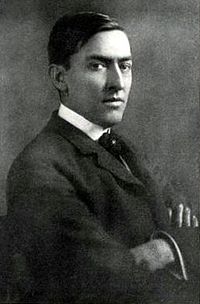George Ade
| George Ade | |
|---|---|

George Ade in 1904
|
|
| Born |
February 9, 1866 Kentland, Indiana |
| Died | May 16, 1944 (aged 78) Brook, Indiana |
| Occupation | Writer, newspaper columnist, and playwright |
George Ade (February 9, 1866 – May 16, 1944) was an American writer, newspaper columnist, and playwright.
George Ade was born in Kentland, Indiana, one of seven children raised by John and Adaline (Bush) Ade. While attending Purdue University, he became a member of the Sigma Chi fraternity. He also met and started a lifelong friendship with fellow cartoonist and Sigma Chi brother John T. McCutcheon and worked as a reporter for the Lafayette Call. He graduated in 1887.
In 1890 Ade joined the Chicago Morning News, which later became the Chicago Record, where McCutcheon was working. He wrote the column, Stories of the Streets and of the Town. In the column, which McCutcheon illustrated, George Ade illustrated Chicago life. It featured characters like Artie, an office boy; Doc Horne, a gentlemanly liar; and Pink Marsh, a black shoeshine boy. Ade's well-known "fables in slang" also made their first appearance in this popular column.
Ade's literary reputation rests upon his achievements as a great humorist of American character during an important era in American history: the first large wave of migration from the countryside to burgeoning cities like Chicago, where, in fact, Ade produced his best fiction. He was a practicing realist during the Age of (William Dean) Howells and a local colorist of Chicago and the Midwest. His work constitutes a vast comedy of Midwestern manners and, indeed, a comedy of late 19th-century American manners. In 1915, Sir Walter Raleigh, Oxford professor and man of letters, while on a lecture tour in America, called George Ade "the greatest living American writer."
Ade's fiction dealt consistently with the "little man," the common, undistinguished, average American, usually a farmer or lower middle class citizen. (He sometimes skewered women, too, especially women with laughable social pretensions.)
Ade followed in the footsteps of his idol Mark Twain by making expert use of the American language. In his unique "Fables in Slang," which purveyed not so much slang as the American colloquial vernacular, Ade pursued an effectively genial satire notable for its scrupulous objectivity. Ade's regular practice in the best fables is to present a little drama incorporating concrete, specific evidence with which he implicitly indicts the object of his satire—always a type (e.g., the social climber). The fable's actual moral is nearly always implicit, though he liked to tack on a mock, often ironic moral (e.g., "Industry and perseverance bring a sure reward").
...
Wikipedia
